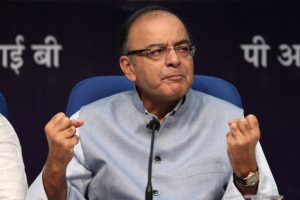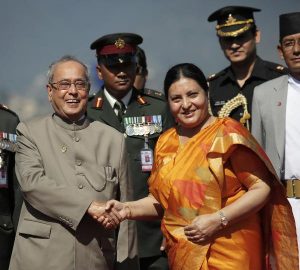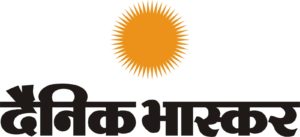
19-11-2016 (Important News Clippings)
To Download Click Here
Is An Honest India Possible?
Curbing corruption requires campaign finance reform and neutral intervention of technology
A fundamental question needs an honest answer beyond political partisanship: For a country that was led to freedom by a man of the unimpeachable rectitude of Mahatma Gandhi, why are our citizens ranked among the most corrupt in the world today?Is there something in our psyche that predisposes us to condone corruption? Do we accept as normal the gulf between precept and practice? Is there a certain moral ambivalence in our notions of right and wrong?Or, is the high level of corruption in our society primarily due to the discretionary power of officials, weak institutional accountability, opaque and deliberately convoluted laws, predatory sarkari inspectors, a dilatory judiciary, and, above all, the nexus between politics and black money?
I raise this issue because at a recent dinner there was this gentleman who was waxing eloquent about rampant corruption in high places, but later casually mentioned to me that he had that very day paid a couple of hundred rupees to a policeman to avoid a traffic challan. Is our outrage against corruption then something like litmus paper, changing with the colour of personal requirements? Is it bad when you have to bribe when you don’t want to, and good when it gets you what you want?
There are always honourable exceptions, but it does seem that for many Indians ethics is largely related to utility. For many who preach about the importance of ethics, the premium in real life is on ends not means, on pragmatism and worldly success not morality. What matters is not any fixity of principle but clarity of purpose.Lakshmi, the goddess of wealth is widely revered, but all invocations to her emphasise the felicity she brings, not the means by which this felicity should be acquired. The aarti to her makes this explicitly clear: Jis ghar mein tum rahti, tahen sab sadguna aata, khan-paan ka vaibhav, sab tumse aata (In the home you inhabit virtues come automatically; all grandeur and luxuries come from you).
The fault is not that of Lakshmi. In fact she may well be unhappy that while a great many of her devotees criticise corruption in the public realm, they secretly admire the dividends it yields. The power and pelf it brings to an individual often benefit members of his extended kin and community, who are not too finicky about whether the largesse is tainted or not.At the same time, the display of lavish lifestyles and money power attracts more envy than opprobrium. In such a milieu, corruption is often equated with a morally neutral entrepreneurship. Those who take bribes, and those who give it, are both ‘entrepreneurs’ bound by the same amoral conviction that money is more important for the ends it achieves and not the means by which it is obtained.
In this sense the issue of corruption is unfortunately entirely removed from the moral domain; it becomes simply a matter of costs, investments, return, tactics and profit. Those who do not understand this are looked upon as impractical deviants, suffering in their world of irrelevant utopianism.It is interesting too that in everyday life the traditional Hindu worldview accepts exemptions to morally correct behaviour. A man can do no wrong if he acts to protect his svadharma, conduct that is right for his jati or station. He cannot be held accountable for actions that are part of his ashramadharam, or stage in life.
He cannot be penalised for transgressions made in the name of kuladharma, conduct that is right for one’s family. And finally, almost anything he does is justified in a situation of distress or emergency, appadharma. In the Mahabharata Yudhishtara, the epitome of rectitude, himself says that dharma is elusive, too subtle to be etched in stone.Keeping these factors in mind, moral exhortation against corruption is unlikely to work in India. What will act as a deterrent are better laws that guarantee exemplary convictions for deviant behaviour. In addition, we need the neutral intervention of technology in as many areas as possible, especially where the common man has to interact with government.
For instance, if you can buy a train ticket or pay your house tax and income tax online, this largely eliminates the role of the human intermediary. In Madhya Pradesh and Bihar the Right to Public Services Act, that enables citizens to receive a service from government in a time bound and transparent manner, with penalties for delay imposed on the pre-identified officer rendering that service, have greatly reduced the scope of corruption.Technology can also help to digitally track all financial transactions, including for benami properties and money illegally stashed abroad. Independent regulators and a model legal framework ensuring transparency in the disposal of national resources and government procurement processes are necessary too.
Finally, but most importantly, corruption can never be eliminated until substantive reform takes place in the funding and financial accountability of political parties. This is the seed of all corruption in India.The real proof of the NDA government’s resolve to curb black money by demonetising notes, will be tested if BJP declares that it will fight all future elections without using unaccounted money. Will BJP, and indeed all political parties, accept this challenge?
सामाजिक सुरक्षा में भी हैं बेनामी संपत्ति की जड़ें
यह अच्छी बात है कि विपक्षी दलों और आर्थिक विशेषज्ञों की मांग को देखते हुए केंद्र सरकार ने बेनामी संपत्ति पर कार्रवाई शुरू कर दी है और आयकर विभाग के दो सौ दल हाईवे के किनारे जांच-पड़ताल के लिए लगा दिए हैं। ऐसी खबरें अक्सर आती हैं कि हाईवे के किनारे की जमीनें परियोजना तैयार होने के साथ ही नेता, अफसर और ठेकेदारों के हाथों सस्ती दरों पर बिक जाती हैं और फिर परियोजना पूरी होने पर वे महंगी दरों पर उनका सौदा करते हैं। निश्चित तौर पर इसमें अधिकार का दुरुपयोग और काले धन का सदुपयोग शामिल है। बेनामी संपत्ति का दूसरा हिस्सा गांव और शहर की उस बेहिसाब पुश्तैनी संपत्ति में शामिल है, जिसे हदबंदी कानून से बचाने के लिए ग्रामीण जमींदार और शहरी अमीर अपनी संपत्ति को नज़दीकी रिश्तेदारों के नाम कर देते हैं। ध्यान रहे कि बेनामी संपत्ति रोकने के लिए एक कानून 1988 में बना था और दूसरा कानून 28 साल बाद 2016 में। एक नवंबर से लागू हुआ यह कानून पहले वाले कानून के मुकाबले तकरीबन ढाई गुना सख्त है। जहां पहले कानून में बेनामी संपत्ति पर तीन साल की सजा थी वहीं मौजूदा कानून में सात साल की सजा का प्रावधान है। लेकिन इन 28 सालों में उदारीकरण की वह तूफानी प्रक्रिया चली है, जिसने न सिर्फ निजी संपत्ति को गौरवान्वित किया है बल्कि मॉरीशस और दक्षिण पूर्व एशिया के रास्ते आने वाले हर तरह के धन को निवेश के नाम पर सैद्धांतिक तौर पर सही ठहराया है। इस बीच बढ़ते उपभोक्तावाद ने जहां लोगों के बीच समाज में तीव्र भौतिकवाद को जन्म दिया है वहीं सामाजिक कल्याण की योजनाएं कम होने के साथ लोगों के बीच असुरक्षा की भावना भी उत्पन्न हुई है। इस बढ़ती असुरक्षा के कारण व्यक्ति अपने और परिवार के नाम पर येन-केन प्रकारेण अधिकतम संपत्ति जमा कर लेना चाहता है। अगर समाज को बेनामी संपत्ति से निजात दिलाना है तो सबसे पहले शिक्षा और स्वास्थ्य जैसे विषयों की जिम्मेदारी सरकार को लेनी होगी। साथ ही उन युवाओं का भी दायित्व सरकार को उठाना होगा जिन्हें या तो नौकरी नहीं मिली है या फिर जो नौकरियां गंवाते रहते हैं। बेनामी संपत्ति पर कार्रवाई से बेवजह बढ़े हुए प्रॉपर्टी के दाम तो गिरेंगे, लेकिन साथ ही निर्माण कार्य धीमा भी पड़ेगा। अब देखना है कि क्या जब्त किए गए मकान, दुकान और प्लॉट किसी आम आदमी के पास जाएंगे या फिर उन्हें नवधनाढ्य ही खरीदेंगे?
हमारे उत्तर-सत्य
बतौर प्रधानमंत्री अपने कार्यकाल का लगभग आधा वक्त पूरा करते हुए नरेंद्र मोदी ने उच्च मूल्य वाली नकदी बदलने के रूप में अपनी पहली बड़ी भूल कर दी है। परंतु कई लोगों ने कहा है कि वे इस वजह से हो रही समस्या के साथ जी लेंगे क्योंकि इसके पीछे काले धन से निपटने जैसा नेक उद्देश्य है। राजनीतिक दृष्टिï से यह बात अहम है। यह मोदी की एक और कामयाबी है जिसके तहत वह देश को अपनी बात समझा लेने में सफल रहे। कुछ सप्ताह पहले भी वह सफलतापूर्वक अपनी बात लोगों से मनवा ले गए थे जब कश्मीर में चल रही ङ्क्षहसा, लंबे कफ्र्यू ओर उसके एकदम अलग-थलग पड़ जाने के बीच उन्होंने एक सैन्य कार्रवाई (सेना और सरकार पर प्रश्न न उठाएं वर्ना आप राष्ट्रीयद्रोही करार दिए जाएंगे) की मदद से पूरी बहस को राष्ट्रीयवाद की दिशा में मोड़ दिया था।
A taxman more friendly
Rules should be drafted with clarity to avoid harassment of taxpayers

The tax statutes should be drafted with precision and clarity so that they can express and serve the intent and purpose of the legislature, lest they are subject to misinterpretation.
Interpretation is the art of finding out the true sense of the enactment or statute. In most cases, this principle is never followed. Taxpayers try to interpret the tax statutes to minimise their tax liabilities. In contrast, tax officers try to interpret the statutes to generate maximum revenue by denying the tax benefits available to taxpayers. The objectives of taxpayers and tax officers are at odds with each other. This has resulted in an increasing number of disputes and litigations. In most cases, the interpretation of tax laws is arbitrary and does not discourage further violations. It is a well-settled principle that tax statutes should be interpreted in favour of the taxpayer. When two opinions are possible, the opinion beneficial to taxpayers should prevail. However, usually, the opposite happens. One of the reasons for this misinterpretation is that the tax statutes are not drafted with clarity. Even the intent of the legislature is not considered by the tax officer while passing the orders. Tax statutes should be drafted in an objective manner to leave no room for misinterpretation.
At present, because of stringent provisions of interest, penalty and prosecution, taxpayers try to find the precise meaning of the tax provisions to derive every available tax benefit. The stringent provisions of tax laws make taxpayers avoid misinterpretation of tax statutes. An incorrect decision may cost them large amounts in interest and penalty in addition to their tax liability. They may also be subject to prosecution.
The tax authorities must interpret tax statutes more wisely. The provisions of tax statutes must be construed to advance its objectives, not to frustrate them. Every taxpayer is entitled to arrange his/her affairs based on the existing law and should not find that his plan has been upset by a different interpretation of the law. When a statute invests a tax officer with authority to act in a specific set of circumstances, it is imperative upon him/her to exercise his authority in a manner appropriate to the case. The power is not discretionary and the officer cannot decline to exercise it. Nor does the tax officer have the power to act beyond the terms under which benefits have been granted to taxpayers.
However, this is not what tax authorities do in practice. One reason is that the officers are not subject to any penalty if they misinterpret tax statutes. They are protected and not penalised for any incorrect additions they make while assessing incomes and liabilities. The same set of rules of interpretation is not applicable to tax officers as applicable to taxpayers. There is no accountability. They don’t even bother to consider the intent of the legislature. In fact, it is common practice to read between the lines and to interpret tax statutes to derive maximum revenue. In some cases, even the orders of tribunals and high courts are not respected, even though tax officials are legally bound to accept the precedent set by the judiciary. Remedial action, through an appeal, is available against the order but not against the tax officer who passes the wrong order.
Section 80HHC provides the best examples of the misinterpretation of tax provisions. It has resulted in lakhs of cases of tax disputes and litigations. Unnecessary tax demands were raised. Every taxpayer claiming a deduction under section 80HHC was put to undue hardship and prolonged litigation. First, there were disputes about the method of calculating the deduction. The second kind of disputes were over whether excise duty is a part of the total turnover to calculate the deduction. Third, whether deductions under section 80HHC are available on the proceeds from the Duty Entitled Pass Book (DEPB) incentive. Most of the disputes were settled in favour of the taxpayers. They resulted only in wasting the time of the tax department, judiciary and taxpayers. This could have been avoided if provisions under section 80HHC had been drafted with clarity, leaving no room for misinterpretation.
Since the Income Tax Act, 1961, was enacted, it has a had history of many such cases of disputes and litigations, causing undue hardship to taxpayers for years. To avoid this, there should be set of rules to implement tax statutes. The tax statutes shall be drafted with clarity to serve the intent and purpose of the legislature.Our tax regime should be a friendly one. Issuing certificates of appreciation to all taxpayers for their contribution is not a remedy. The true principles of interpretation should be followed to avoid the excesses of tax officers. Taxpayers should be protected from corrupt officials.
RAJESH M. KAYAL The writer is a chartered accountant
Reaching the new normal
President Pranab Mukherjee’s visit to Nepal has helped restore equilibrium to bilateral ties.

The Nepali authorities pulled out all the stops to ensure that the visit was a success. Mr. Mukherjee’s itinerary included visits to Janakpur and Pokhara, and civic receptions in both Kathmandu and Janakpur. In Pokhara, he addressed a large gathering of Gurkha ex-servicemen of the Indian Army. These public events provided suitable platforms which he used in a statesmanlike manner to restore a degree of balance in India-Nepal relations that have been through a turbulent period since Kathmandu’s adoption of the new constitution in September last year.
From the beginning, it was clear that the Madhesis were unhappy with the new constitution but at that time, the Pahadi leadership of the three main parties — Nepali Congress (NC), CPN(UML) and Maoists — were in a hurry to wrap up the seven-year-long exercise. By the time India reacted, it was too late and the new constitution was promulgated.
Meanwhile, unrest and agitations gripped the Terai. The government, headed by the then Prime Minister K.P.S. Oli, made little effort to engage in a dialogue with the agitating groups. Instead, it blamed India for imposing an economic ‘blockade’ to pressure the government to accede to Madhesi demands. Eventually, after harsh rhetoric, both sides pulled back but the damage was done. An anti-Indian sentiment had been fanned. Mr. Oli’s coalition collapsed, and he finally resigned in July, once again blaming India for his ouster.
Maoist leader Pushpa Kamal Dahal Prachanda struck a deal with the NC to take over as Prime Minister for a period of nine months after which the Maoists will support NC leader Sher Bahadur Deuba as PM for a similar period till the next elections in January 2018. To his credit, Mr. Prachanda set about trying to repair relations with India with a successful bilateral visit in September. In the near future Nepal President Bidhya Devi Bhandari is expected to visit India. All this should mark a return to normal in the relationship between the two countries. Yet such was the damage done during Mr. Oli’s tenure that even during President Mukherjee’s visit, #PranabDaSaySorry was trending on social media. The Nepal government had declared November 2 a public holiday amid innuendoes that this was done to keep roads clear and prevent any embarrassing demonstrations.
A presidential message
During his visit, virtually every Nepali political leader met President Mukherjee. In public, his message was consistent and unambiguous: Nepal needs to complete the political transition that began a decade ago when the Maoists came overground and agreed to join the democratic political process; and secondly, in order to consolidate the gains of multiparty democracy, all sections need to be brought on board for the new constitution to succeed.
In addition, he highlighted the historical and civilisational links between the people of the two countries and linked the destinies of the two countries by emphasising that they have a “vital stake in each other’s well-being and security”. He praised the people of Nepal for their achievement in the quest for peace and stability, describing it as a “historic undertaking”. In Janakpur, he talked of the spiritual ties among the people by invoking Ram and Sita but without mentioning either Hinduism or secularism, a sensitive issue in the new constitution. His visit to Pokhara to address the ex-servicemen was tribute to the bravery of the 32,000 Gurkhas currently serving in the Indian Army and the 126,000 pensioners.
Even in Nepal, not many are aware that in addition to the Nepali Rs.4,000 crore that is now disbursed annually after the OROP implementation in terms of pensions, India has substantial welfare schemes covering solar electrification and drinking water supply to ex-servicemen’s villages, medical care and provision of ambulances to their associations, and education and scholarships for their children. In Pokhara, he highlighted the advantages of the 1950 Treaty of Peace and Friendship that enables Nepali citizens to find easy employment in India.
Mr. Mukherjee was not expected to announce any major projects though the announcements about renovating the ghats along the Bagmati river just below Pashupatinath temple and the construction of two dharamsalas adjoining the Janaki Mandir in Janakpur address long-standing Nepali requests. More significant was that Nepali students will now be eligible to sit for the entrance examinations for the IITs and the additional scholarships for postgraduate studies in water resources management and hydel power at IIT, Roorkee.
Prachanda’s challenges
PM Prachanda has his hands full. A third of his nine-month tenure is over and the dialogue with the Madhesi groups has not made any discernible progress. Without forward movement, it will be difficult for him to have the local body elections during his stint. The issue pertaining to the number of parliamentary seats from the Terai had been resolved in January by a constitutional amendment restoring ‘population’ as the key criteria in delimiting electoral constituencies though the Madhesis have yet to accept closure on it. Issues pertaining to provincial demarcation, restrictions on appointment to high-level constitutional positions for naturalised citizens, status of Hindi and other languages and composition of the upper house are still pending.
These are contentious and require a degree of political consensus which is still missing. The NC and the Maoists do not have complete agreement between themselves yet and neither do the Madhesi groups have a unified negotiating position. Consequently, the dialogue has been desultory so far.Of these, provincial demarcation is possibly the most complex but if movement is registered on the others, it would create a positive climate in which to devise a mechanism for the demarcation. The second difficulty will be to get the two-thirds majority necessary for a constitutional amendment. For this, the CPN(UML) will need to be brought on board, and Mr. Oli is not showing any signs of relenting though there are others who may be more amenable to a compromise.
Mr. Mukherjee’s successful visit, coming after Mr. Prachanda’s official visit to India in September followed by a second visit to Goa for the BRICS-BIMSTEC outreach summit, has helped stabilise India-Nepal relations. This has provided Mr. Prachanda with much-needed political room for manoeuvre; he now needs to use his considerable negotiating skills to make progress on the pending constitutional issues during the remaining part of his short tenure.
Rakesh Sood is a former diplomat who served as Ambassador to Nepal and is currently a Distinguished Fellow at the Observer Research Foundation, Delhi.




